Social Cognitive Theory and its Aspects with Case Studies Analysis
VerifiedAdded on 2022/01/20
|6
|1626
|480
Essay
AI Summary
This essay provides an overview of Social Cognitive Theory (SCT), initially developed by Albert Bandura, which emphasizes learning within a social context through reciprocal interactions between a person, behavior, and environment. The essay explores key aspects of SCT, including observational learning, retention, reproduction, and motivation, using case studies of Grand UK holidays and coach tours to illustrate these concepts. It highlights the importance of self-efficacy, as described by Bandura, and its impact on goal-setting and challenges. The essay discusses how SCT encourages individuals to build self-efficacy and the benefits of observational learning. By analyzing the case studies, the essay demonstrates how SCT can be effectively applied to understand and modify behavior in real-world scenarios, emphasizing the role of past experiences, reinforcement, and mental states in influencing behavior. The essay concludes by reiterating Bandura's success in highlighting the importance of SCT and its application to the case studies.

Research Skills 2 (Skills for Higher Education)
1
1
Paraphrase This Document
Need a fresh take? Get an instant paraphrase of this document with our AI Paraphraser
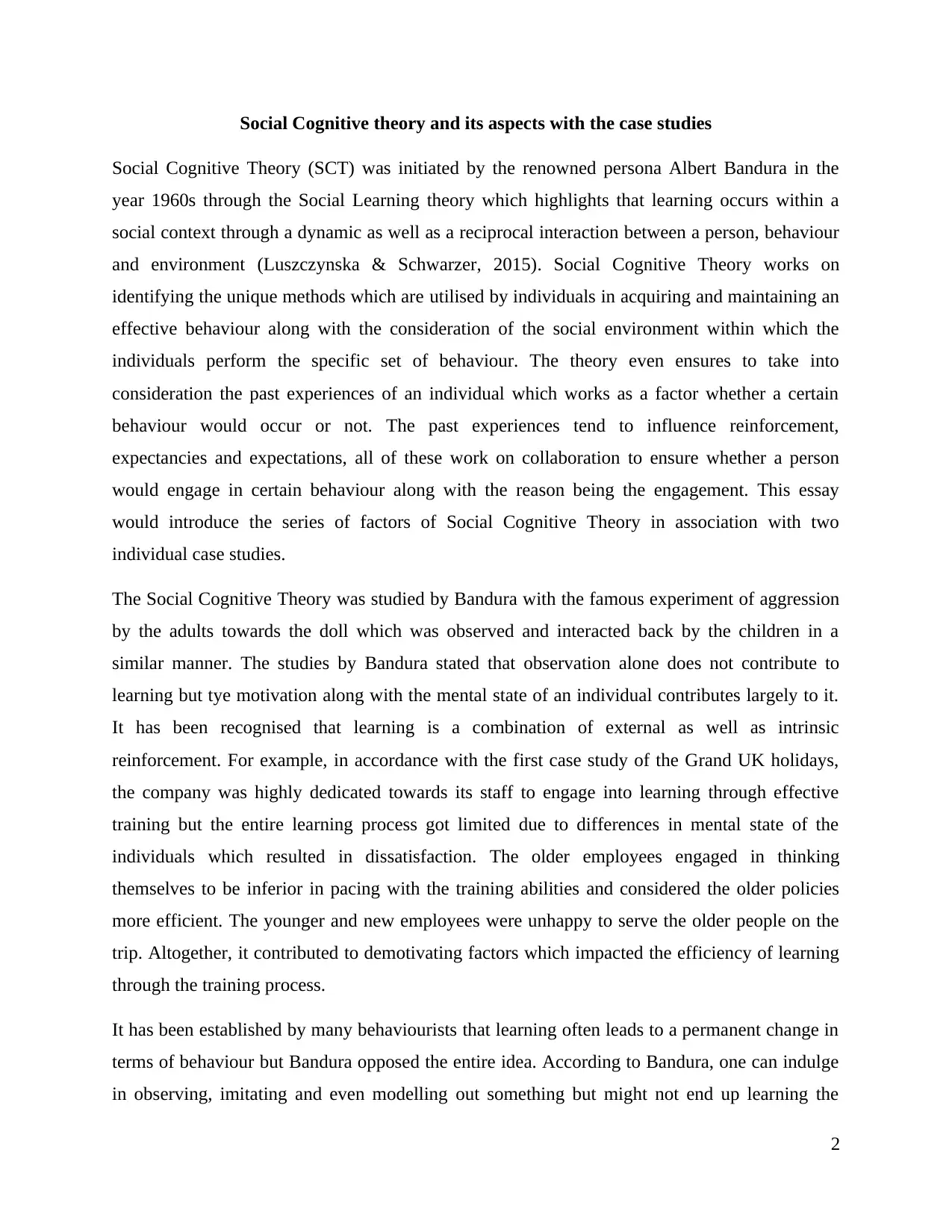
Social Cognitive theory and its aspects with the case studies
Social Cognitive Theory (SCT) was initiated by the renowned persona Albert Bandura in the
year 1960s through the Social Learning theory which highlights that learning occurs within a
social context through a dynamic as well as a reciprocal interaction between a person, behaviour
and environment (Luszczynska & Schwarzer, 2015). Social Cognitive Theory works on
identifying the unique methods which are utilised by individuals in acquiring and maintaining an
effective behaviour along with the consideration of the social environment within which the
individuals perform the specific set of behaviour. The theory even ensures to take into
consideration the past experiences of an individual which works as a factor whether a certain
behaviour would occur or not. The past experiences tend to influence reinforcement,
expectancies and expectations, all of these work on collaboration to ensure whether a person
would engage in certain behaviour along with the reason being the engagement. This essay
would introduce the series of factors of Social Cognitive Theory in association with two
individual case studies.
The Social Cognitive Theory was studied by Bandura with the famous experiment of aggression
by the adults towards the doll which was observed and interacted back by the children in a
similar manner. The studies by Bandura stated that observation alone does not contribute to
learning but tye motivation along with the mental state of an individual contributes largely to it.
It has been recognised that learning is a combination of external as well as intrinsic
reinforcement. For example, in accordance with the first case study of the Grand UK holidays,
the company was highly dedicated towards its staff to engage into learning through effective
training but the entire learning process got limited due to differences in mental state of the
individuals which resulted in dissatisfaction. The older employees engaged in thinking
themselves to be inferior in pacing with the training abilities and considered the older policies
more efficient. The younger and new employees were unhappy to serve the older people on the
trip. Altogether, it contributed to demotivating factors which impacted the efficiency of learning
through the training process.
It has been established by many behaviourists that learning often leads to a permanent change in
terms of behaviour but Bandura opposed the entire idea. According to Bandura, one can indulge
in observing, imitating and even modelling out something but might not end up learning the
2
Social Cognitive Theory (SCT) was initiated by the renowned persona Albert Bandura in the
year 1960s through the Social Learning theory which highlights that learning occurs within a
social context through a dynamic as well as a reciprocal interaction between a person, behaviour
and environment (Luszczynska & Schwarzer, 2015). Social Cognitive Theory works on
identifying the unique methods which are utilised by individuals in acquiring and maintaining an
effective behaviour along with the consideration of the social environment within which the
individuals perform the specific set of behaviour. The theory even ensures to take into
consideration the past experiences of an individual which works as a factor whether a certain
behaviour would occur or not. The past experiences tend to influence reinforcement,
expectancies and expectations, all of these work on collaboration to ensure whether a person
would engage in certain behaviour along with the reason being the engagement. This essay
would introduce the series of factors of Social Cognitive Theory in association with two
individual case studies.
The Social Cognitive Theory was studied by Bandura with the famous experiment of aggression
by the adults towards the doll which was observed and interacted back by the children in a
similar manner. The studies by Bandura stated that observation alone does not contribute to
learning but tye motivation along with the mental state of an individual contributes largely to it.
It has been recognised that learning is a combination of external as well as intrinsic
reinforcement. For example, in accordance with the first case study of the Grand UK holidays,
the company was highly dedicated towards its staff to engage into learning through effective
training but the entire learning process got limited due to differences in mental state of the
individuals which resulted in dissatisfaction. The older employees engaged in thinking
themselves to be inferior in pacing with the training abilities and considered the older policies
more efficient. The younger and new employees were unhappy to serve the older people on the
trip. Altogether, it contributed to demotivating factors which impacted the efficiency of learning
through the training process.
It has been established by many behaviourists that learning often leads to a permanent change in
terms of behaviour but Bandura opposed the entire idea. According to Bandura, one can indulge
in observing, imitating and even modelling out something but might not end up learning the
2
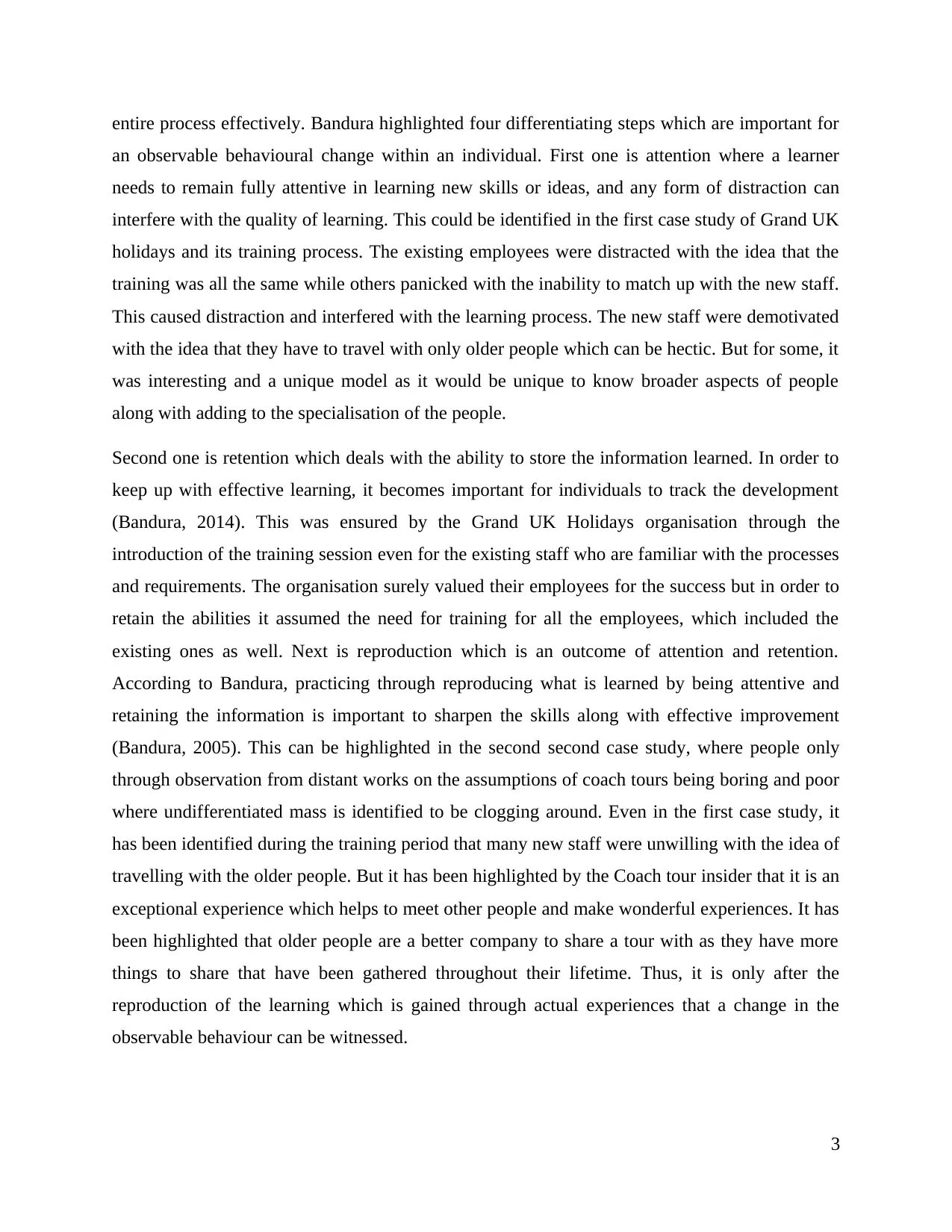
entire process effectively. Bandura highlighted four differentiating steps which are important for
an observable behavioural change within an individual. First one is attention where a learner
needs to remain fully attentive in learning new skills or ideas, and any form of distraction can
interfere with the quality of learning. This could be identified in the first case study of Grand UK
holidays and its training process. The existing employees were distracted with the idea that the
training was all the same while others panicked with the inability to match up with the new staff.
This caused distraction and interfered with the learning process. The new staff were demotivated
with the idea that they have to travel with only older people which can be hectic. But for some, it
was interesting and a unique model as it would be unique to know broader aspects of people
along with adding to the specialisation of the people.
Second one is retention which deals with the ability to store the information learned. In order to
keep up with effective learning, it becomes important for individuals to track the development
(Bandura, 2014). This was ensured by the Grand UK Holidays organisation through the
introduction of the training session even for the existing staff who are familiar with the processes
and requirements. The organisation surely valued their employees for the success but in order to
retain the abilities it assumed the need for training for all the employees, which included the
existing ones as well. Next is reproduction which is an outcome of attention and retention.
According to Bandura, practicing through reproducing what is learned by being attentive and
retaining the information is important to sharpen the skills along with effective improvement
(Bandura, 2005). This can be highlighted in the second second case study, where people only
through observation from distant works on the assumptions of coach tours being boring and poor
where undifferentiated mass is identified to be clogging around. Even in the first case study, it
has been identified during the training period that many new staff were unwilling with the idea of
travelling with the older people. But it has been highlighted by the Coach tour insider that it is an
exceptional experience which helps to meet other people and make wonderful experiences. It has
been highlighted that older people are a better company to share a tour with as they have more
things to share that have been gathered throughout their lifetime. Thus, it is only after the
reproduction of the learning which is gained through actual experiences that a change in the
observable behaviour can be witnessed.
3
an observable behavioural change within an individual. First one is attention where a learner
needs to remain fully attentive in learning new skills or ideas, and any form of distraction can
interfere with the quality of learning. This could be identified in the first case study of Grand UK
holidays and its training process. The existing employees were distracted with the idea that the
training was all the same while others panicked with the inability to match up with the new staff.
This caused distraction and interfered with the learning process. The new staff were demotivated
with the idea that they have to travel with only older people which can be hectic. But for some, it
was interesting and a unique model as it would be unique to know broader aspects of people
along with adding to the specialisation of the people.
Second one is retention which deals with the ability to store the information learned. In order to
keep up with effective learning, it becomes important for individuals to track the development
(Bandura, 2014). This was ensured by the Grand UK Holidays organisation through the
introduction of the training session even for the existing staff who are familiar with the processes
and requirements. The organisation surely valued their employees for the success but in order to
retain the abilities it assumed the need for training for all the employees, which included the
existing ones as well. Next is reproduction which is an outcome of attention and retention.
According to Bandura, practicing through reproducing what is learned by being attentive and
retaining the information is important to sharpen the skills along with effective improvement
(Bandura, 2005). This can be highlighted in the second second case study, where people only
through observation from distant works on the assumptions of coach tours being boring and poor
where undifferentiated mass is identified to be clogging around. Even in the first case study, it
has been identified during the training period that many new staff were unwilling with the idea of
travelling with the older people. But it has been highlighted by the Coach tour insider that it is an
exceptional experience which helps to meet other people and make wonderful experiences. It has
been highlighted that older people are a better company to share a tour with as they have more
things to share that have been gathered throughout their lifetime. Thus, it is only after the
reproduction of the learning which is gained through actual experiences that a change in the
observable behaviour can be witnessed.
3
⊘ This is a preview!⊘
Do you want full access?
Subscribe today to unlock all pages.

Trusted by 1+ million students worldwide
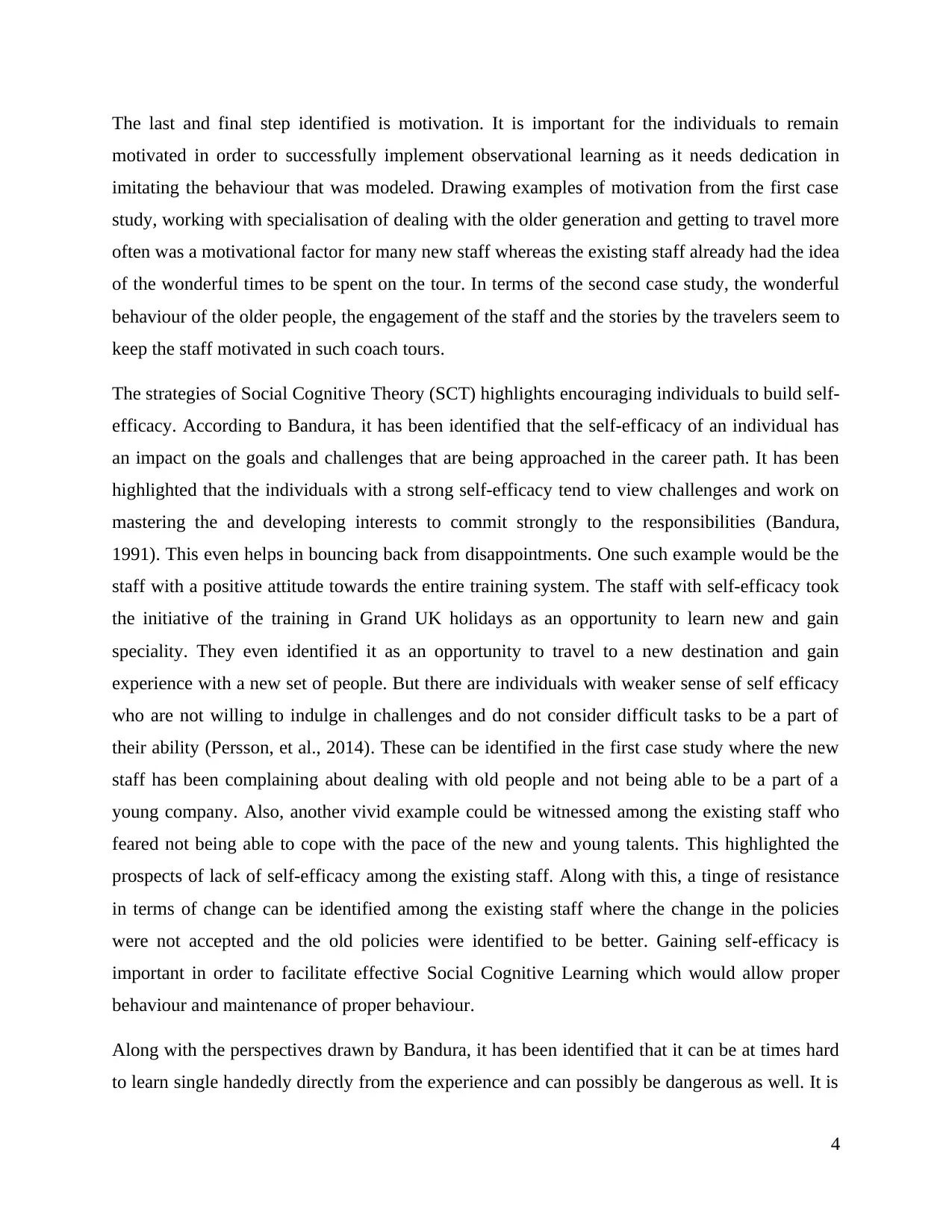
The last and final step identified is motivation. It is important for the individuals to remain
motivated in order to successfully implement observational learning as it needs dedication in
imitating the behaviour that was modeled. Drawing examples of motivation from the first case
study, working with specialisation of dealing with the older generation and getting to travel more
often was a motivational factor for many new staff whereas the existing staff already had the idea
of the wonderful times to be spent on the tour. In terms of the second case study, the wonderful
behaviour of the older people, the engagement of the staff and the stories by the travelers seem to
keep the staff motivated in such coach tours.
The strategies of Social Cognitive Theory (SCT) highlights encouraging individuals to build self-
efficacy. According to Bandura, it has been identified that the self-efficacy of an individual has
an impact on the goals and challenges that are being approached in the career path. It has been
highlighted that the individuals with a strong self-efficacy tend to view challenges and work on
mastering the and developing interests to commit strongly to the responsibilities (Bandura,
1991). This even helps in bouncing back from disappointments. One such example would be the
staff with a positive attitude towards the entire training system. The staff with self-efficacy took
the initiative of the training in Grand UK holidays as an opportunity to learn new and gain
speciality. They even identified it as an opportunity to travel to a new destination and gain
experience with a new set of people. But there are individuals with weaker sense of self efficacy
who are not willing to indulge in challenges and do not consider difficult tasks to be a part of
their ability (Persson, et al., 2014). These can be identified in the first case study where the new
staff has been complaining about dealing with old people and not being able to be a part of a
young company. Also, another vivid example could be witnessed among the existing staff who
feared not being able to cope with the pace of the new and young talents. This highlighted the
prospects of lack of self-efficacy among the existing staff. Along with this, a tinge of resistance
in terms of change can be identified among the existing staff where the change in the policies
were not accepted and the old policies were identified to be better. Gaining self-efficacy is
important in order to facilitate effective Social Cognitive Learning which would allow proper
behaviour and maintenance of proper behaviour.
Along with the perspectives drawn by Bandura, it has been identified that it can be at times hard
to learn single handedly directly from the experience and can possibly be dangerous as well. It is
4
motivated in order to successfully implement observational learning as it needs dedication in
imitating the behaviour that was modeled. Drawing examples of motivation from the first case
study, working with specialisation of dealing with the older generation and getting to travel more
often was a motivational factor for many new staff whereas the existing staff already had the idea
of the wonderful times to be spent on the tour. In terms of the second case study, the wonderful
behaviour of the older people, the engagement of the staff and the stories by the travelers seem to
keep the staff motivated in such coach tours.
The strategies of Social Cognitive Theory (SCT) highlights encouraging individuals to build self-
efficacy. According to Bandura, it has been identified that the self-efficacy of an individual has
an impact on the goals and challenges that are being approached in the career path. It has been
highlighted that the individuals with a strong self-efficacy tend to view challenges and work on
mastering the and developing interests to commit strongly to the responsibilities (Bandura,
1991). This even helps in bouncing back from disappointments. One such example would be the
staff with a positive attitude towards the entire training system. The staff with self-efficacy took
the initiative of the training in Grand UK holidays as an opportunity to learn new and gain
speciality. They even identified it as an opportunity to travel to a new destination and gain
experience with a new set of people. But there are individuals with weaker sense of self efficacy
who are not willing to indulge in challenges and do not consider difficult tasks to be a part of
their ability (Persson, et al., 2014). These can be identified in the first case study where the new
staff has been complaining about dealing with old people and not being able to be a part of a
young company. Also, another vivid example could be witnessed among the existing staff who
feared not being able to cope with the pace of the new and young talents. This highlighted the
prospects of lack of self-efficacy among the existing staff. Along with this, a tinge of resistance
in terms of change can be identified among the existing staff where the change in the policies
were not accepted and the old policies were identified to be better. Gaining self-efficacy is
important in order to facilitate effective Social Cognitive Learning which would allow proper
behaviour and maintenance of proper behaviour.
Along with the perspectives drawn by Bandura, it has been identified that it can be at times hard
to learn single handedly directly from the experience and can possibly be dangerous as well. It is
4
Paraphrase This Document
Need a fresh take? Get an instant paraphrase of this document with our AI Paraphraser
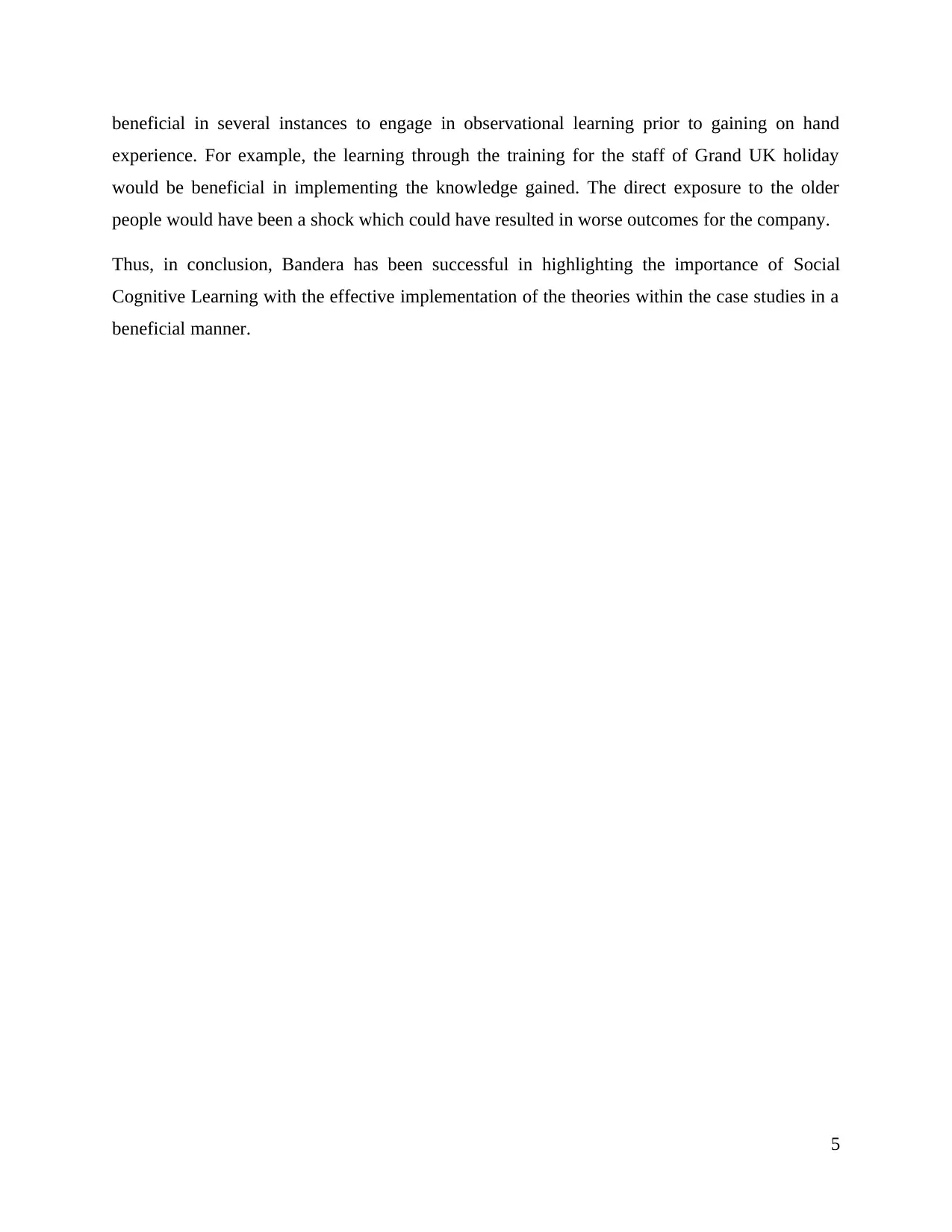
beneficial in several instances to engage in observational learning prior to gaining on hand
experience. For example, the learning through the training for the staff of Grand UK holiday
would be beneficial in implementing the knowledge gained. The direct exposure to the older
people would have been a shock which could have resulted in worse outcomes for the company.
Thus, in conclusion, Bandera has been successful in highlighting the importance of Social
Cognitive Learning with the effective implementation of the theories within the case studies in a
beneficial manner.
5
experience. For example, the learning through the training for the staff of Grand UK holiday
would be beneficial in implementing the knowledge gained. The direct exposure to the older
people would have been a shock which could have resulted in worse outcomes for the company.
Thus, in conclusion, Bandera has been successful in highlighting the importance of Social
Cognitive Learning with the effective implementation of the theories within the case studies in a
beneficial manner.
5
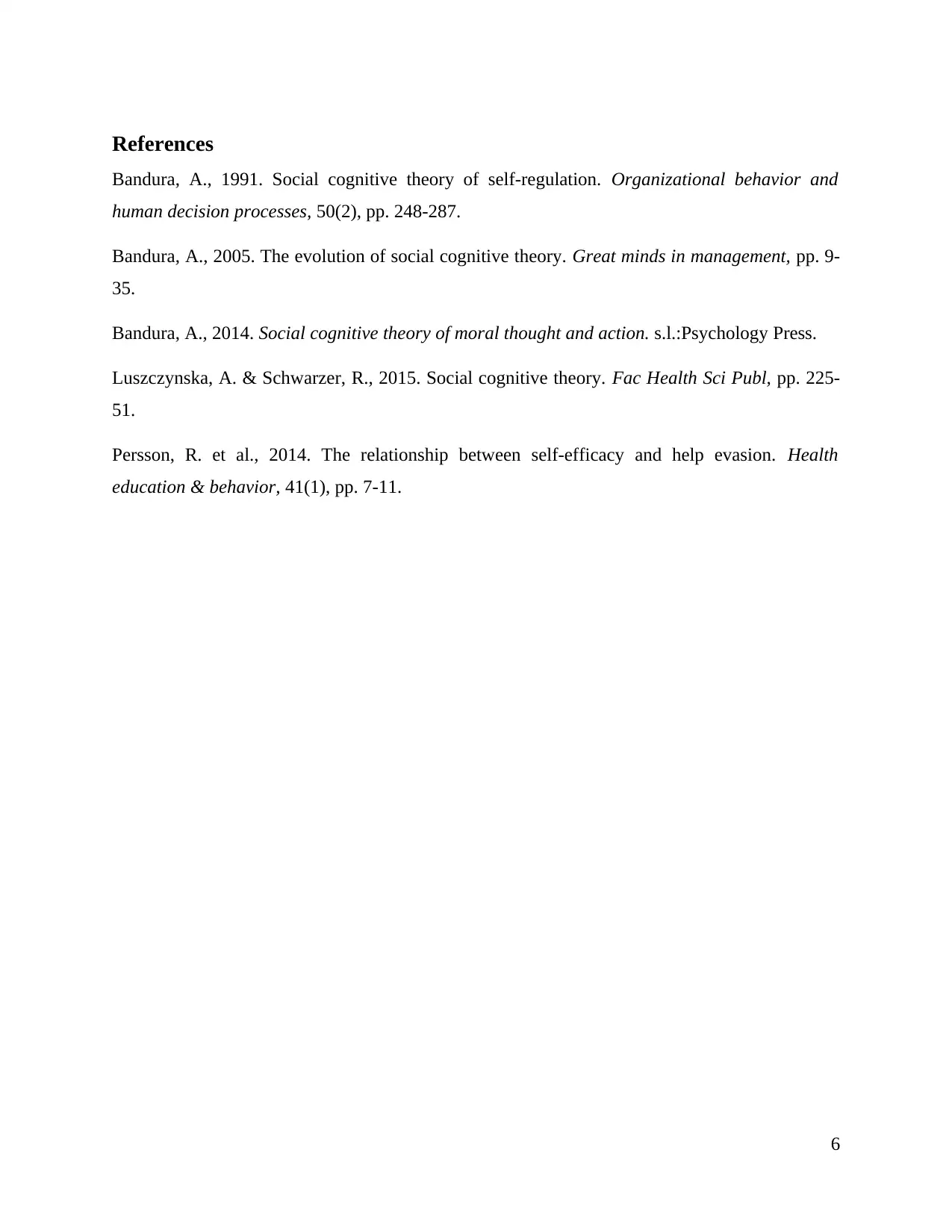
References
Bandura, A., 1991. Social cognitive theory of self-regulation. Organizational behavior and
human decision processes, 50(2), pp. 248-287.
Bandura, A., 2005. The evolution of social cognitive theory. Great minds in management, pp. 9-
35.
Bandura, A., 2014. Social cognitive theory of moral thought and action. s.l.:Psychology Press.
Luszczynska, A. & Schwarzer, R., 2015. Social cognitive theory. Fac Health Sci Publ, pp. 225-
51.
Persson, R. et al., 2014. The relationship between self-efficacy and help evasion. Health
education & behavior, 41(1), pp. 7-11.
6
Bandura, A., 1991. Social cognitive theory of self-regulation. Organizational behavior and
human decision processes, 50(2), pp. 248-287.
Bandura, A., 2005. The evolution of social cognitive theory. Great minds in management, pp. 9-
35.
Bandura, A., 2014. Social cognitive theory of moral thought and action. s.l.:Psychology Press.
Luszczynska, A. & Schwarzer, R., 2015. Social cognitive theory. Fac Health Sci Publ, pp. 225-
51.
Persson, R. et al., 2014. The relationship between self-efficacy and help evasion. Health
education & behavior, 41(1), pp. 7-11.
6
⊘ This is a preview!⊘
Do you want full access?
Subscribe today to unlock all pages.

Trusted by 1+ million students worldwide
1 out of 6
Related Documents
Your All-in-One AI-Powered Toolkit for Academic Success.
+13062052269
info@desklib.com
Available 24*7 on WhatsApp / Email
![[object Object]](/_next/static/media/star-bottom.7253800d.svg)
Unlock your academic potential
Copyright © 2020–2026 A2Z Services. All Rights Reserved. Developed and managed by ZUCOL.




